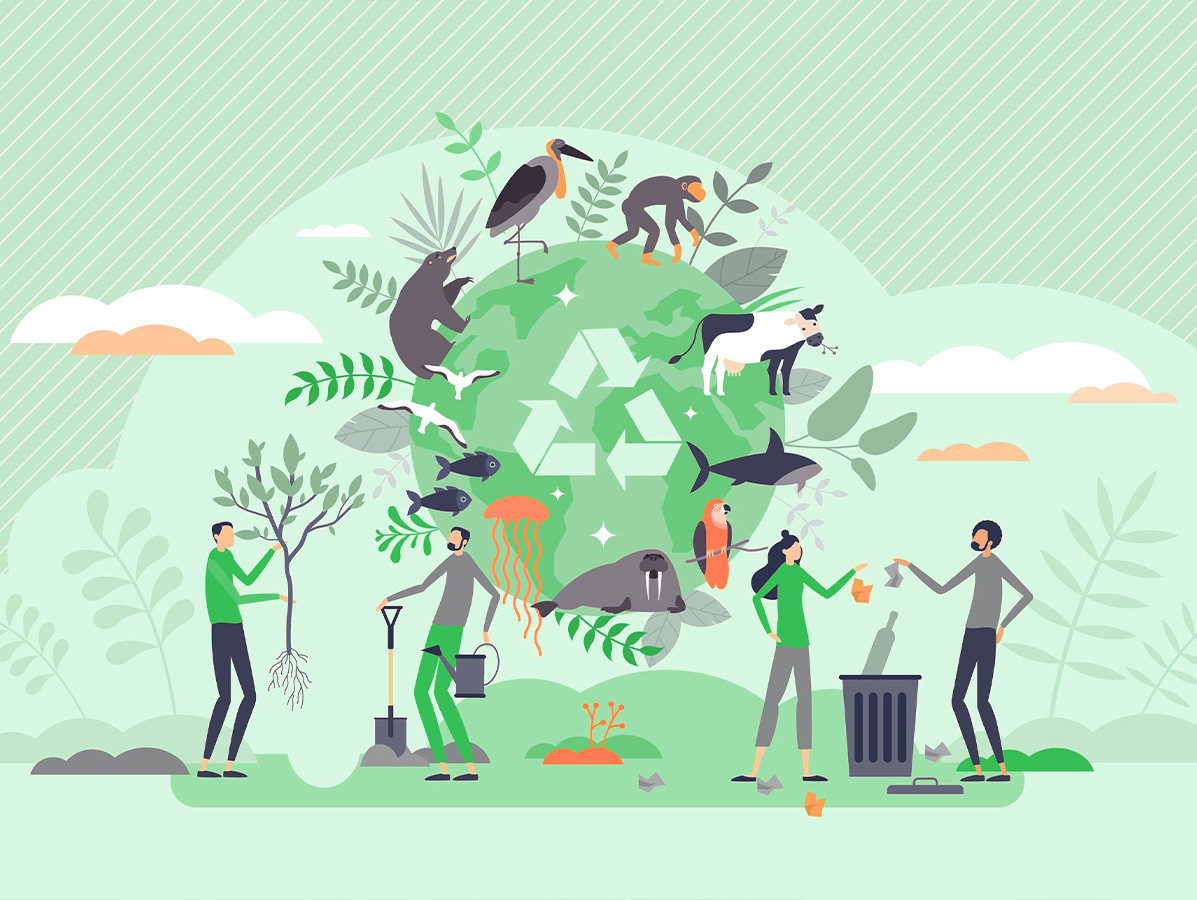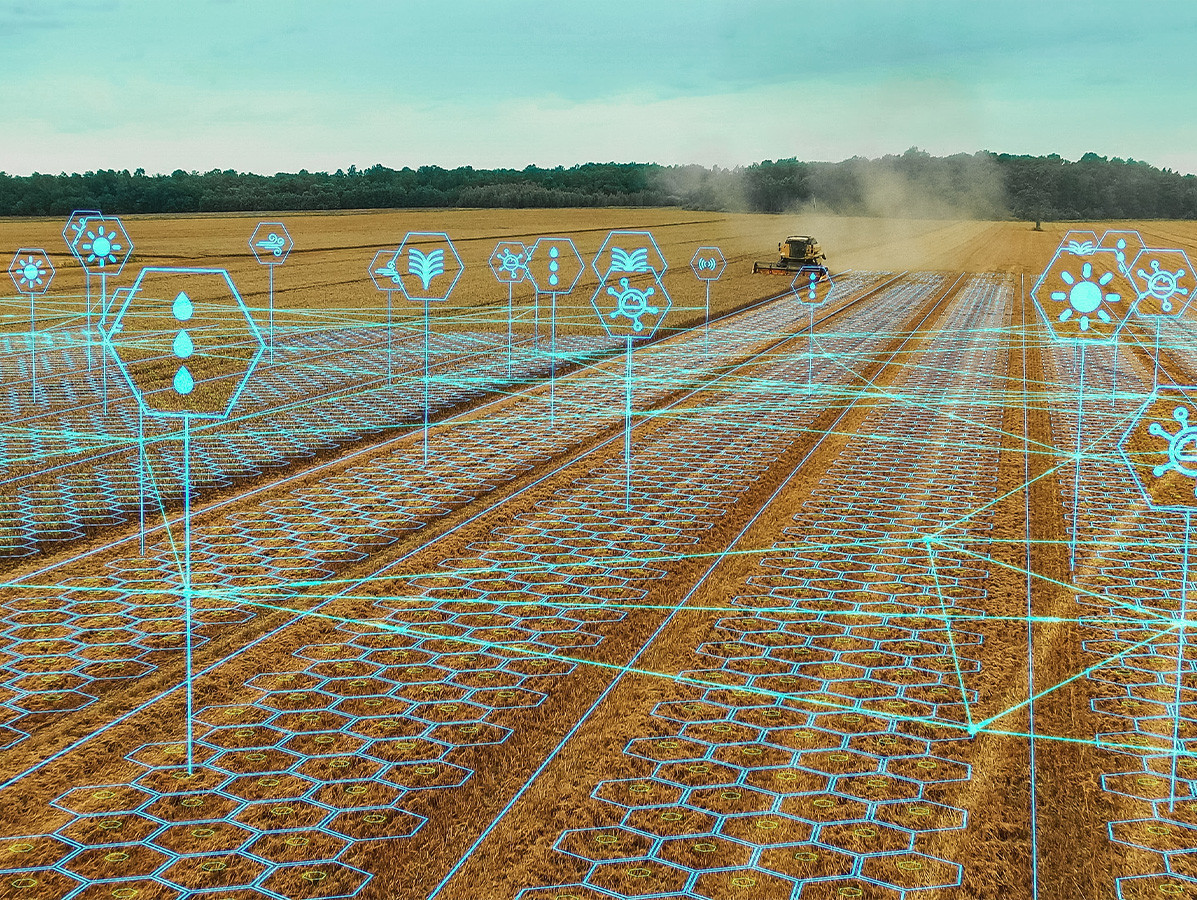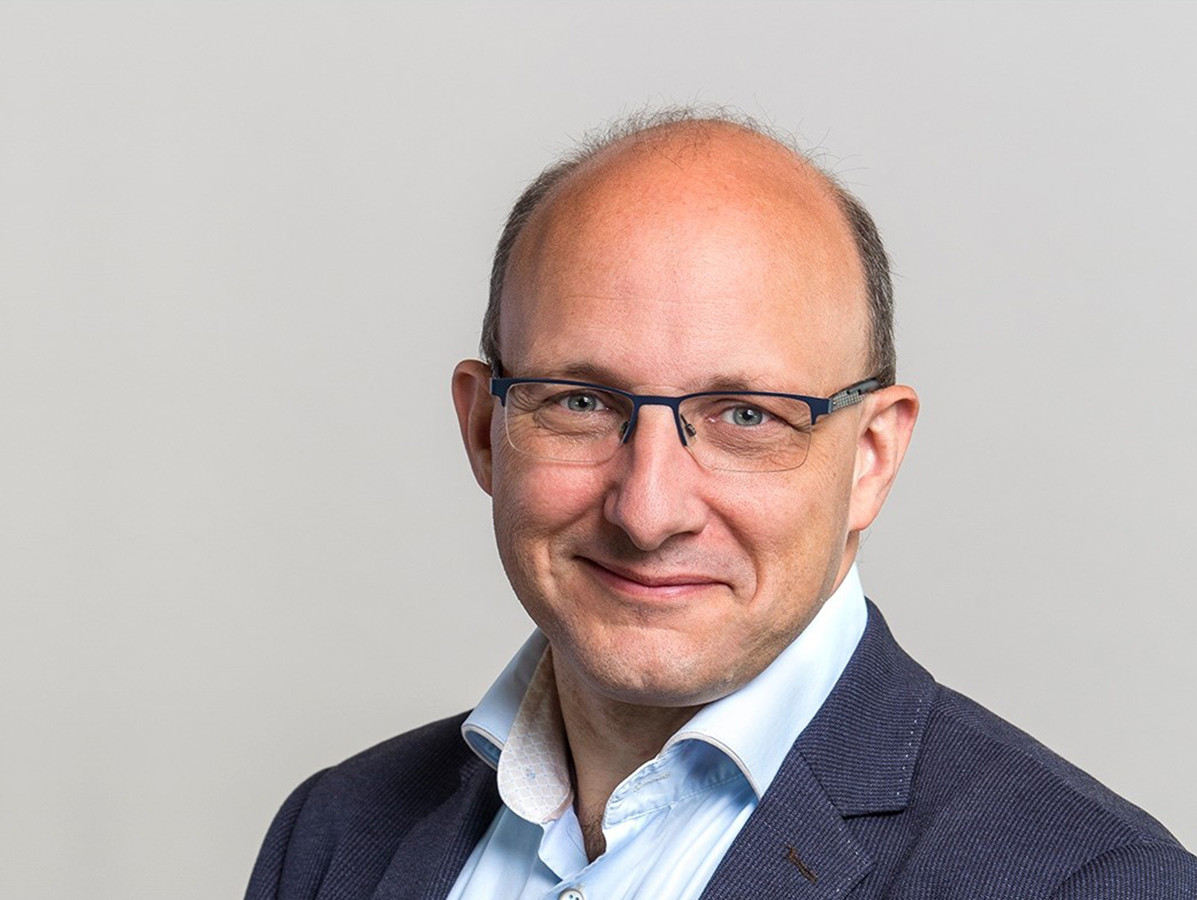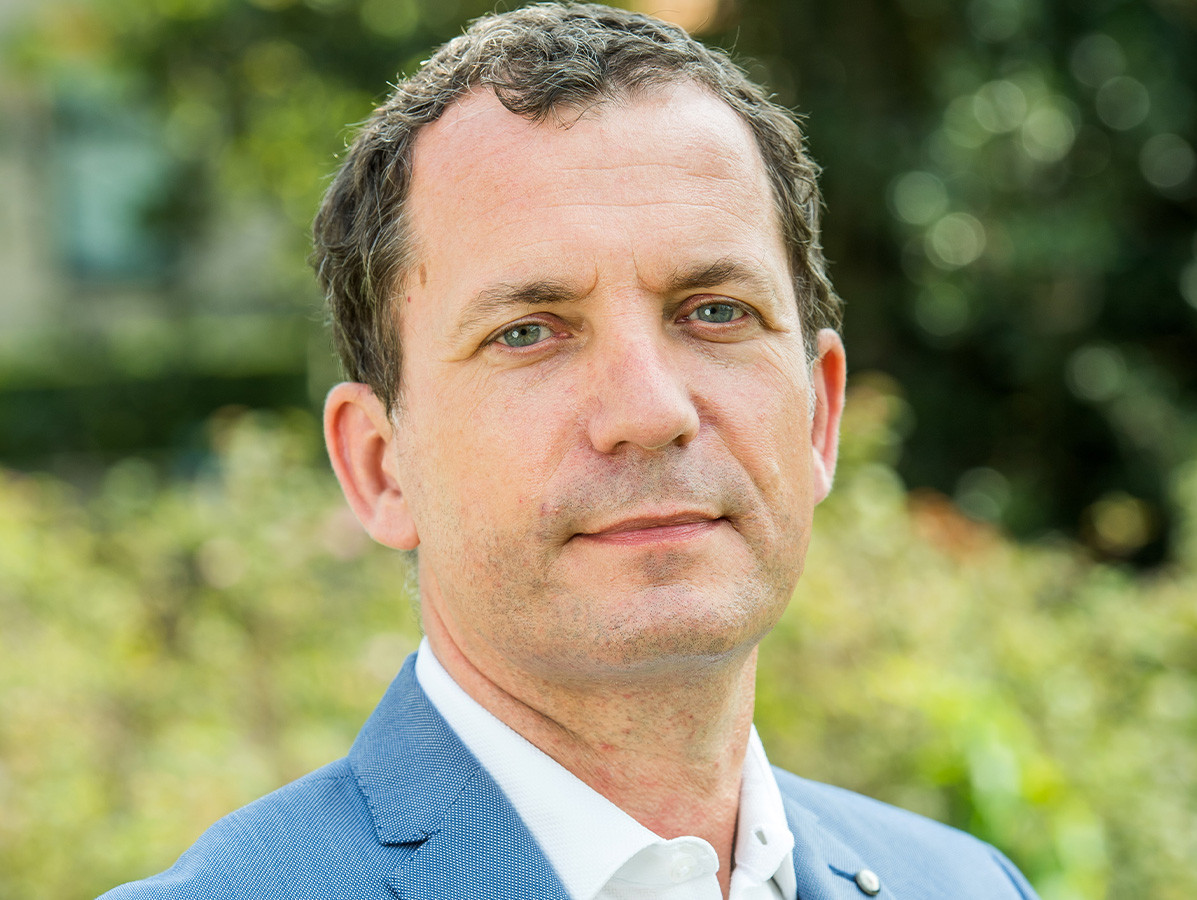
The food sector is under a magnifying glass when it comes to sustainability. Not surprisingly, as the whole system of food production, packaging, distribution and consumption has a huge impact on nature. Yet we cannot do without this industry to feed everyone worldwide. It has to change. But how?
The figures don't lie. Eighty percent of deforestation, 70% of biodiversity loss and almost a third of greenhouse gas emissions are caused by food production, outlines Corné van Dooren, Sustainable Food Advisor at the World Wildlife Fund. "There has to be a better balance between people and nature, with a diet that combines healthy and sustainable," he argues. Together with Rob Verhagen, Sustainability director at OPACKGROUP - of which Oerlemans Plastics is part - we talk about these and other pressing issues. From their different perspectives, both experts share their views on the challenges and possible solutions for the food sector.
"There are 3 big challenges around sustainability and packaging," Rob points out. "Our waste management system, reducing CO2 emissions and reducing overconsumption of raw materials. By working circularly, we turn waste into raw materials, reduce CO2 and need fewer new materials. So circular economy is not an end, but a means to sustainability. We also need to focus more on reuse and reduction: so opt less for single-use - and more often for reusable options. There is a lot to be gained in e-commerce: a whole box for a single pen is really not acceptable anymore. Furthermore, we must ensure that packaging materials do not end up in the environment; there is still a lot to be done in terms of waste management."
Corné: "A big challenge in the short term is also the energy issue: how are we going to produce food without using fossil fuels? Can transport be electric or on hydrogen? The greenhouses in Westland burn 10% of our natural gas. We have to switch to alternative sources before 2030; not an easy task.
In the longer term: how do we ensure food security? Climate change and geopolitics mean there is a lot of fluctuation in the supply and price of raw materials. The government's primary task is to make sure its citizens have enough to eat. That also means guaranteeing that we can properly source raw materials that meet sustainability criteria, with producers getting a fair price."
Corné: "It should contain a lot more vegetable and fewer animal ingredients, and preferably fresh and locally produced rather than highly processed products. Choose products that are sustainably produced as much as possible, for example with organic and nature-inclusive forms of agriculture. It is also important that we start trying to get more variety on our plates; eating healthy and varied food is not only important for our bodies, but also in relation to biodiversity. Two-thirds of what we eat comes from just nine crops. That is too one-sided and makes the food system vulnerable."
Corné: "Yes indeed, we subscribe to the goal of 60% vegetable protein in 2030. So there is room for 40% animal. We are still eating too much animal-based protein, and we really need to reduce that. We think it is important to make optimal use of the nutrients that are available: for instance, by not feeding chickens and pigs with soy from rainforest areas or corn, but with animal feed made from residual flows from food production. In the 1990s, when high river peaks led to near-floods, WWF presented the 'Room for Rivers' concept. This formed the basis for a national government flood safety programme. You can continue to use those floodplains for food production by letting cows graze there. The impact of meat production is not the only issue, by the way. The enormous water use for avocado production, for example, and deforestation caused by coffee, also deserve our attention."

Corné: "Agree: innovation is desperately needed for sustainable, affordable and available food. There are so many problems that call for smart solutions. In agriculture, for example, we are very dependent on artificial fertilisers. Can't we make that circular? How can we bring phosphate back into the cycle? Are there crops that can withstand drought and/or salinisation better, and how do we achieve better yields of legumes in the Netherlands?"
Rob: "Also agree, but I think what matters most is focus. We have to formulate clear objectives for the future and clarify what everyone has to comply with. That ensures the right investments, and therefore the right innovations. The government is now coming up with lots of ideas and trial runs. If you leave it to the local governments, you create a patchwork of legislation across Europe. That's not going to help the Netherlands as an exporting and food-producing country."
Rob: "Around sustainable packaging, there are numerous dilemmas. Are you going to use less material or more recyclate? With a stretch sleeve you use significantly less material, but you can only use 30% recyclate. With a shrink sleeve, that material becomes a lot thicker, but 60% recyclate is possible. We need to understand very well what a packaging does; is it essential to extend shelf life, or mainly for transport? To make packaging truly circular, it is very important to use recyclate. This can be done in primary packaging, which already happens a lot in PET, but also in secondary packaging. This gives value to waste. Waste that has value is reused. By using recyclate, a lot of CO2 reduction is possible; up to 35 to 80%, depending on the type of recyclate. Moreover, you need fewer new raw materials, so that problem is also solved."
Rob: "There is no uniformity, which brings me back to the lack of focus. The European definition of 'high-quality recycling for plastic packaging' is that plastic packaging should come back as plastic packaging. Sounds logical. For paper, metal, glass and wood, however, that condition does not exist: an aluminium beverage can may also come back as a bicycle and printed paper in the office as toilet paper; after all, that is also circular. For plastic, the situation is different. Now one law demands: 'you have to use more recyclate'. Another law says: 'you have to have official approval for that'. At EFSA, there are 230 applications for food-safe recyclate, which are not approved. At the same time, there is also a list of 900 substances that should not come into contact with food. Of these, 37% cannot be technically analysed; it cannot be demonstrated that one of these substances is not present. Consequently, you are stranded as a producer, we fail to close the circle and we do not get a circular economy."
"Due to the lack of focus, unintended side effects of laws and regulations are often not properly considered. I consider that alarming," he continues. "For example, in Europe there is talk of introducing a 'plastic tax'. That sounds good, but in practice the countries that want to introduce the tax all refer to different things. In England, they say 'You have to use a minimum of 30% recyclate. If you do that you don't have to pay a levy.' In Spain and Italy, they only want to tax new plastic. The unwanted effect of this, however, is that other materials can be added to avoid the tax. The risk of that is that recyclability could go down again. The basis is clear: reuse and reduce where possible. The best possible use of recyclate and all packaging recyclable. This vision is also expressed in the new Packaging and Packaging Waste Regulation. Anticipating the legislation, we at OPACKGROUP have recently commissioned a new €20 million plant where we make recyclable barrier packaging. We are anticipating the law and, as a company, taking a lot of risk in doing so. Nevertheless, we are convinced that this is the right direction."

Rob Verhagen
""Definitely about the decline in biodiversity due to soil depletion, deforestation, overfishing and climate change," he answers firmly. Passionately, he continues, "Biodiversity is the foundation of a healthy planet. We need nature; for the food of the future, for CO2 retention. It's five to 12 when it comes to that. We also really do see opportunities to reverse that trend; by producing with respect for nature. We need to regain awareness of the value of food. The modern consumer is too disconnected from the way our food is made. We need to realise again that the farmer has invested heavily to produce food, the producer to process it, preserve it, package it and control its quality. For all that effort, you have to pay the price that goes with it. You don't want to waste that food. So drink a bit less coffee or eat less meat, and enjoy it a bit more."
Rob: "To pick up on your 'respecting nature'; what frustrates me a lot in this is that there are still a lot of items being made that we are sure will end up in the environment. Examples include balloon races and fireworks - full of heavy metals, toxins and plastic particles, and the microplastics in some shampoos and cosmetics; we can and do all these things. To give the legislator an unequivocal recommendation, with a focus on long-term impact, we really have to cooperate a lot more in the chain."
Corné: "From initiatives like the 'Greendeal Protein-rich crops'. The aim is to improve the production and consumption of pulses in the Netherlands by, among other things, creating a healthy earnings model for Dutch growers of protein-rich crops, and increasing the sale of food products containing proteins grown in the Netherlands. The whole chain is involved; from government and research institutes to breeders, growers, processors and retailers. Good cooperation is essential, circularity being the starting point. We also welcome the 'Kumming-Montreal agreement' concluded in December 2022. The core of that agreement is that 30 per cent of the total land area, both land and sea, should be declared a protected area by 2030. Other targets for 2030 are that food waste and the use of pesticides and harmful chemicals should be halved by then. Unfortunately, it has not yet been determined how this should be done, which will cause some international controversy. In addition, there is a European climate deal, the new European forest law and a legislative framework 'Framework for Sustainable Food Systems' (FSFS). The latter aims to accelerate and facilitate the transition to sustainable food systems. We are negotiating with the European Commission for this. Within the FSFS, we are working on a future legislative framework for sustainability labelling, which should enable consumers to make informed and sustainable food choices. All these initiatives show that the tide is turning in Europe. Sustainability is being seriously addressed."
Rob: "True. The new law requiring entrepreneurs to integrate sustainability in annual reports, the 'Corporate Sustainability Reporting Directive (CSRD)' law, also proves that. It means we have to start consciously making good considerations on a lot of topics, focusing on how sustainable your choices really are. Which direction are we heading in? What do we consider important? But also: how does your business make a real impact with its business operations."

Corné van Dooren
Rob: "Packaging land 2025 will already look very different. As already discussed, a lot of new legislation is coming. The Single Use Plastic document will be further developed. And an important vision document is coming with the Packaging & Packaging Waste regulation. Reuse systems, especially for catering and on the move, will become the new standard. Next year, the regulation will already be introduced for coffee cups. At fast-food chains you will eat from reusable and washable containers and at festivals, too, we will go from single-use to multi-use, that will be the new standard. All packaging material will soon have to be recyclable. Within the food industry, a lot of packaging is not yet recyclable. Think of window packaging made of paper with plastic, and packaging in which different plastics are glued together as layers. We are now entering the market with a whole new fully recyclable packaging material. What do we do? We change the structure of ordinary polyethylene packaging material, by 'stretching' it. This makes it clearer, gives it a higher barrier and puncture resistance, and often allows us to reduce its weight by half. We laminate this new 7-layer polyethylene against regular mono polyethylene. The result is a recyclable barrier packaging made from an 8-layer film. A multilayer though, not a multi-material and therefore 100% recyclable."
Corné: "This year, with WWF, we are focusing on raising awareness. There will be a campaign emphasising the link between what you eat and its effect on nature. In doing so, we want to convey a more positive message, namely that by how and what you eat, you can also protect nature. There is a younger generation that already realises this more and tries to act accordingly."
Corné: "Look ahead and beyond the first few years. Research how younger generations view food and what they find important in life, because they are the consumers of the future. There are many great initiatives for new product chains in the Netherlands. There are real opportunities there for food producers. Look at Hak, which is experimenting with sustainable cultivation of bean varieties that did not originally grow in the Netherlands but can be grown and processed here. Another concrete example is the growing consumption of nuts. Many of those nuts now come from faraway countries, but farmers in the Netherlands have already started growing nuts sustainably. A brand needs to be built around that, and a sales channel must be created for it. It is still a niche market at the moment, but certainly offers opportunities for entrepreneurs."
Rob: "My tip: don't keep waiting to innovate until it's all clear and finalised legally. Get to work now. A technical change is often only a small part of the change processes you have to go through. The various departments within your company need to start working together more in order to jointly arrive at the best, most sustainable solution. That internal decision-making usually takes longer than the actual technical transition. You can't solve complex problems like the sustainability issue alone; that requires an integrated approach," he concludes. "Collaboration is key: 'If you want to travel fast, travel alone. If you want to travel far, travel together.'"
Main photo: ©VectorMine/shutterstock.com, photo agriculture: ©Gorodenkoff/shutterstock.com
Source: Vakblad Voedingsindustrie 2023